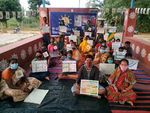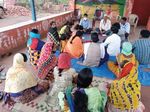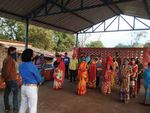CITY POLITICS - Janaagraha
←
→
Page content transcription
If your browser does not render page correctly, please read the page content below
CITY POLITICS
NEWSLETTER FROM JANAAGRAHA
April, 2021
Hello,
Our vision behind the 'City Politics' newsletter is to redefine what politics should ideally mean for our cities. In our efforts,
we don’t want to look at politics from the conventional lens of ‘party politics’ but 'politics of anything that affects our
quality of life like garbage, transportation, electricity and footpaths etc.’ Through this newsletter, we hope to connect with
& create a thriving community of people passionate about urban politics, policies, concerns, and reforms. We assure you
that you will leave as a more informed and educated citizen of this country! Let’s synergize our efforts and make a sincere
attempt to make our cities a better place to live in.
JAGA MISSIONIZING CHANGE MAKERS
We are in an unimaginable time
in the history of humanity when
poverty is urbanizing and cities
are swelling up; leading to
widespread disparity and
inequalities across communities.
Nestled, in the eastern coast of
India, Odisha is home to 18 lakh people living in
urban poverty; who are marked with high social
inequalities leaving the state at cross-roads of
socio-economic development. To end this vicious
circle, the honorable Chief Minister of Odisha, Shri
Naveen Patnaik took a historic decision of giving
Land Rights Certificates to the slum dwellers
residing in smaller cities and towns in 2017. The
Odisha Legislative Assembly, passed the ‘Odisha
Liveable Habitat Mission – JAGA’ that was to
transform the slums into liveable habitats
beginning with guarantee of land rights to slum dwellers, creating and upgrading civic and social infrastructure to support immaculate
service delivery, create opportunities for livelihood and empower slum-dwellers to become the flag-bearers of the fourth tier of
governance in the state.
For a nascent three-year-old mission, JAGA has become unique in many ways - for the first time, drone surveys were undertaken that
determined the fudgy slum territories, identified legitimate 63,175 land beneficiaries and additionally recognized 99,311 potential land
owners. It pioneered a cadre of over 24,000 civic leaders (leaders from Slum Dwellers Associations) who became representative of
community voice – by identifying and addressing issues pertaining to infrastructure, in collaboration with city leaders and municipal
staff; and continuing to be part of urban service delivery. Odisha that has a legacy of women collectives, saw the SDAs booming with
women leadership that not only represented voices of change from low-income communities, but with their wide networks and mobility
increased family’s access to public entitlements and schemes. They emerged as an unswerving workforce that has been driving
interventions in the urban eco-system in a subtle yet meaningful manner.
Functioning on the primary objective of addressing inequalities through integration and social inclusion, the mission continues to create
conditions for reducing growth of slums, building resilience through slum proofing and has pushed an imagination of progress from
community to city level. Today, it has successfully enabled delisting of over five hundred slums, that are now equipped with basic
infrastructure, better service delivery but most importantly, a strong leadership that continues to drive change in their new elevated roles
as members of Resident Welfare Associations.
JAGA began with a notable noble thought, and continues to showcase a pro-people policy, backed with stellar implementation strategies,
and committed leadership that has cascaded down from the honorable Chief Minister to a SDA leader within a slum, in true sense.
Recipient of both international recognitions – of World Habitat Award, Geo-Spatial Award and several national mentions, JAGA will
unfold a new thinking on how cities can transform with strong participation of people and political leadership and will, as they blend to
become a mission of change makers that will support the recovery of our cities and allow them to bounce back in the aftermath of the
pandemic. For a state that has grappled with poverty, a changed approach in managing human capital is a non-negotiable and Odisha
has certainly earned brownie points in it already.
Preeti Prada Panigrahi is Senior Manager, Civic Participation
01CITY POLITICS, A NEWSLETTER BY APRIL, 2021
UNITY AND THE COMMUNITY
“Personally, my most gratifying moment has been to witness how a community of people can forego portions of asset, for community’s
wellness. In Gudadharma Sagar Slum, Jatni Slum Dweller Associations came together to decide that they would share parcels of their
lands for construction of a common road and drainage network in front of their houses. JAGA Mission continues to mandate
community’s involvement in every phase, but this was a completely different experience when community’s unity and trust to better lives
and immediate environment was exemplary,” said Sourav Mohanty
EMPOWERING VOICES
“What is common between a rickshaw puller, a vegetable seller, a mason, or driver is that all of them live in slums. Not anymore, each one
of them is a leader in his or her community, leading remarkable infrastructure works, implementing it as well as monitoring to ensure that
the civic assets adhere to certain quality benchmarks. Having a say in one’s own lives is as important as having a roof over their head, or
access to toilet. And JAGA Mission has brought that out for millions of people in Odisha. Steaming with power, they now move to be
proud recipients of land, upgraded neighbourhoods with open spaces and get to also change names of their slums and be recognized as
Adarsh colonies,” said Adarsh Kedia
LEADERSHIP COUNTS
“Jaga Mission has been a people’s movement- from the SDA leaders to the government officials, each one of them played a significant
role to build and strengthen the process, in record breaking time of five months. Officers earmarked their time and resources towards
slum development and governance, despite the demands on their labour and limitations that are a result of the on-going pandemic. Each
of the officers- Ms. Sweta Padma, Executive Officer, Khurda; Mr. Dillip Mohanty, Executive Officer, Jatni and Mr. Atanu Samantaray; under
the seasoned leadership of Mr. G. Mathivathanan, Principal Secretary; Mr. Sangramjit Nayak, Director Municipal Administration and
Sushant Kumar Mishra, Joint Secretary; outperformed on their commitment of delisting. The success of the process calls for a celebra-
tion. The cornerstone of Jaga Mission remains to be the political will from Honorable Chief Minister that fueled the passion to make
change happen. Through the past year, leaders emerged at every stage, to reimagine how slum upgradation and delisting can become a
reality,” said Somenath Kar
Adarsh, Somenath and Sourav came into the Mission as Jaga Fellows, before joining Janaagraha. They continue to lead field implementation
work
02CITY POLITICS, A NEWSLETTER BY APRIL, 2021
“My job will be to convert the theory of change that Janaagraha
has into a demand for change by ordinary citizens”
Your experiences range from
IT, Civic Activism, Politics
and now with a NGO, what is
that one factor that guided
your choices?
To see a better India, to be different
vehicles of change. I did not choose any NGO, I chose
Janaagraha. I feel at this point of time, Janaagraha offers
the best vehicle for change.
Why do you think that Janaagraha offers
the best vehicle for change?
Change happens at different levels. As Janaagraha is
working at ward, city, state and central level it is best positioned to create change at all these levels. It combines elements of movement,
advocacy and extensive study of Indian cities like no one else.
Unlike politicians and activists, social sector organisations are not often in limelight. Should the
social sector be part of the narrative?
Absolutely, if you are not then you are not directing the country. It might work for some organisations to be cornered but not for
Janaagraha.
What should the social sector do so that its voices are heard?
Their voices should represent a large cross-section of society, it should be based on inclusive philosophy and broader dialogue. They
should not be a part of the ‘Not invented here syndrome’, should be open to critical feedback and build a broader coalition even with
whom they don’t agree, only then they will be part of the mainstream narrative.
What hurdle in the political economy of the country has kept urban reforms from being
implemented?
There isn’t enough public pressure on the political economy. The decibel levels and numbers haven’t reached a level where reaction
becomes necessary as the demand for urban reforms is still in its infancy.
Janaagraha has been championing the cause of urban reforms for many years now. What is your
vision for Janaagraha in the long run?
Janaagraha has a lot of good answers for urbanisation problems but people who are suffering are unable to connect the dots to the
solutions that Jannagraha is offering. My job will be to convert the theory of change that Janaagraha has into a demand for change by
ordinary citizens.
In this context what is the role of ‘City Politics’ Facebook, LinkedIn or newsletter?
City Politics is a forum to identify and get together people, groups and methods working to address gaps in governance. It is a forum to
learn, identify good practices and scale them up. To ensure that silently people start participating and act as a bridge between citizens
and local governments. Local Governments need citizen participation as well for effective governance but there is a trust gap, through
city politics we want to bridge this trust gap.
Tête-à-Tête with Srinivas Alavilli, Head, Civic Participation
03CITY POLITICS, A NEWSLETTER BY APRIL, 2021
EMPOWERING LOCAL LEADERSHIP: JAIPUR CHAPTER
03
India, home to 377 million urban residents is expected to add 300 million more by 2050. Around 70% of India’s GDP is
expected to be generated from cities. However, Indian cities continue to grapple with various issues like waste
management, pollution, inadequate transportation, over-crowding and so on.
Good Governance at the local level has become an arduous task due to complex legislative structures, scarce
resources, the line dividing separation of powers getting thinner, the overlap of roles between different government
agencies getting murkier and the role of technology increased more than ever before. Robust city governance is not
just about creating legal and political structures, but also about building local authority’s capacity. Given the dynamism of the role, the
knowledge and skills burden on elected representatives is very high in order to do justice to the expectations from their job. Being closest
to the people, the role of city councilors and city governments has invariably increased.
Janaagraha has always been committed to empowering political representatives especially at the local level, which is also one of the
pillars of Janaagraha’s City Systems approach. In an attempt to realise the same, upon the invitation of Jaipur based grassroots
organisation Mahila Housing SEWA Trust (MHST), on 20th March 2021, Vivek Anandan Nair and I trained around 20 corporators of
Jaipur.
The Councillors were trained on various aspects like the 74th Constitutional Amendment Act (CAA), the powers that the 12th Schedule
has devolved to the urban local bodies (ULBs), the Municipal structure in Rajasthan, various provisions of the Rajasthan Municipalities
Act, 2009; the working and the overlap of various government agencies and parastatals in Jaipur, the concept of the ward committees,
their working and case studies where they are functional. The councillors were further empowered by giving a copy of the latest budget
of Jaipur, we also conducted a group activity on ways to come to a consensus on complex issues between councillors, citizens and
bureaucrats.
On interactions with the councillors, we observed that almost none of them had clarity on basic provisions of urban governance like the
74th CAA, they were working only on a handful of provisions devolved by the 12th Schedule, and while they had heard about the ward
committees there was a complete lack of clarity. One of the councillors said, “While we are told what to do for winning elections no one
tells us what should we do after winning elections and how do we handle complexities of governance, we are glad that you took this
initiative”, another councillor added in his thank you speech that, “Generally we do not attend a meeting for more than one hour but here
we stayed on for 6 hours, Janaagraha along with MHST was able to get councillors from both from Congress and BJP and both
Municipal Corporations of Jaipur on one platform and create consensus on critical issues, we congratulate you for that”. At the end of
the session the councillors unanimously invited for more such training sessions in different zones of Jaipur. Considering the need for
training at the local level and given our wonderful experience in Jaipur, Janaagraha would continue in its mission to train local elected
representatives in order to strengthen urban governance in India.
Chinmay Dandekar is Associate, Advocacy and an avid Policy YouTuber.
04CITY POLITICS, A NEWSLETTER BY APRIL, 2021
DID YOU KNOW?
Glimpse of Urban Governance Glimpse of Urban Governance
in West Bengal in Assam
Pros Cons Pros Cons
» Municipal Elections » The Mayor is elected » The term of the Mayor is » Municipal Elections are
are held every 5 years indirectly 5 years not conducted regularly,
» The term of the » In practice, an average » The reservation for e.g last municipal
Mayor is 5 years of 11/18 functions are women in council is 50% election in Guwahati was
» Ward Committees devolved as per the 12th » Ward Committees are conducted in 2013
are provided by Law schedule of the provided by law & they » The mayor is elected
& they are largely Constitution are largely functional (in indirectly
functional » Reservation for women case of active councils) » In practice, an average of
» Metropolitan Planning in council is 33% and not » There is a mandate for 9/18 functions are
Committee (MPC) is 50% Medium Term Fiscal devolved as per the 12th
constituted in Kolkata » There is no participatory Plan schedule of the
» Area Sabhas are budgeting » Area Sabhas are Constitution
provided by law » There is no mandate for provided by law » There is no participatory
Medium Term Fiscal budgeting
Plan
Pratima Chabbi, Sandhya D'Souza, Vishwajith H.R, Chinmay Dandekar & Juwairia Mehkri
working last minute to deliver local news that matters! Hope you enjoy it!
We would love to hear from you. Send us your feedback or get in touch with us at teamcp@janaagraha.org
06
05You can also read



























































